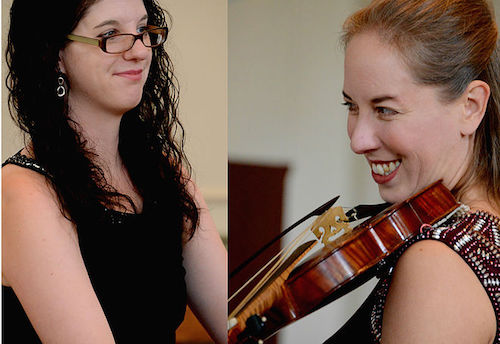by Jarrett Hoffman

Some see their art as an important refuge, something that’s both pure and purifying. Others feel art should dig into the noise, perhaps as a way to understand it more deeply.
The latter mindset informs the most recent program from Burning River Baroque. In three concerts this weekend, Malina Rauschenfels (Baroque cello, soprano) and Paula Maust (harpsichord) will examine works by Couperin, Rameau, Jacquet de la Guerre, Caccini, Eccles, and Courbois under the light of the #MeToo era. They’ll also compare texts from those pieces with lyrics from some of today’s pop music to see what has changed, and what hasn’t.
Rauschenfels and Maust will bring “Destructive Desires” to St. Alban Episcopal Church on Saturday, October 20 at 7:30 pm, then to the sanctuary at Lakewood Congregational Church on Sunday, October 21 at 2:00 pm. A donation of $10-20 is suggested, and Sunday’s proceeds will benefit YWCA Greater Cleveland. An earlier house concert will take place on Friday, October 19 beginning at 7:30 pm in Cleveland Heights — details here on how to attend.
I reached Rauschenfels in Cleveland and Maust in Baltimore, together in a group call over Skype.
Jarrett Hoffman: Some people think pieces that express something hurtful or hateful shouldn’t be programmed. With these concerts, you’re saying they do need to be performed — but with the appropriate context in order to point out what’s troubling about them.
Malina Rauschenfels: Right. We have to see how the past is influencing the present or we’re just unaware. It’s so easy to see a problematic relationship in a movie and then not identify it in your own life. The activity of putting pieces through this lens helps us with that.
Paula Maust: And things that were written in the Baroque era are not so far removed from things that get written today. Over the six-hour drive from Baltimore to Cleveland when we did these concerts in August, I just listened to pop music on the radio. I kept hitting “seek,” scrolling through all of the pop stations, intentionally listening for the most egregious lyrics I could find. And there were two pieces that I heard multiple times that were unbelievable — the lyrics had pretty much the exact same message as all of these Baroque pieces. And this is pop music post-2005.
MR: And it’s what we raise our kids on. We wonder why so-and-so on the news thinks it’s okay to treat women like they do. Well, the answer is radio, movies — all of it.
PM: The Baroque music that we’re doing told the popular stories of the time, and it was the music that people knew. So the same kind of connection can be made today with pop music. We have lyrics that talk about tying a woman to a bed and setting the house on fire. It’s like nothing has changed — we’re getting there, but we’re not there yet. So we’re interested in pointing out how ideas from the 18th and 17th centuries — or even older — are still really relevant, and what we can do as a society to start creating constructive change.
JH: Are there any songs, artists, or movies you want to point out as examples?
PM: We’ll share those at the concert, so that will be a surprise. At the end of the performances in August, I read the libretto of one of our pieces side by side with the texts of several songs that people know and recognize, and it was always really shocking. Our first performance was at the Bard High School Early College, and there was this audible gasp. It was pretty amazing — a really valuable moment, I think.

MR: We try to pick an organization for each concert depending on our theme. Last March we partnered with the Refugee Society of Cleveland and performed for Holocaust victims. In the spring we’re collaborating with the Renee Jones Empowerment Center, which works with victims of human trafficking. And this concert, we’re partnering with YWCA because their mission is so close to our hearts. We’re really interested in finding these nonprofits and introducing them to people in Cleveland, because I don’t think music should live in a void.
Published on ClevelandClassical.com October 16, 2018.
Click here for a printable copy of this article


